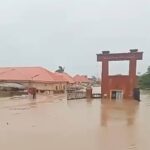
The recommendations of the Presidential Flood Committee for the establishment of the National Flood Management Council, (NFMC) among other proposals to tackle the perennial flooding in Nigeria may be futile without legislative backing, AMEH OCHOJILA reports.
On 23 June, Trademore Estate along Airport Road in Abuja, the Federal Capital Territory (FCT) was submerged by flood following hours of heavy rain. According to reports, no fewer than 116 houses were affected by the flood that followed a torrential rain.
It was gathered that the floods at the Estate were caused by infractions on the water channel. Many residents were allegedly rendered homeless as a result of the incident.
Abuja, Kogi, Benue and other 32 states regularly experience seasonal flooding. The floods of 2022 were the worst since 2012. According to the National Emergency Management Agency (NEMA), in 2012, 363 lives were lost, 5,851 were injured; 3,891,314 were affected, and 3,871,530 displaced. Reports have shown that in the 2022 flood, over 1.4 million people were displaced, 665 reported dead and thousands injured.
The economic damage to residential and non-residential buildings, infrastructure, productive sector, and farmland was $7.3 billion, while the damage in 2022 is estimated at $6.68 billion (FMHAD&SD, 2022 and WB, 2022).
In an effort to tackle flooding, a Presidential Flood Committee was raised by the then President, Muhammadu Buhari. The committee, chaired by the former Minister of Water Resources, Engr. Suleiman Adamu, submitted its reports in May 2023 and proposed far-reaching recommendations towards ending the perennial flooding in Nigeria.
Top among the recommendations was for the establishment of an 18-man National Flood Management Council, (NFMC) to be chaired by the Vice President of the country.
Principally, the committee was established to seek long-term solutions to the perennial flooding in Nigeria and its impacts on the citizens of Nigerians.
As a way of seeking a long-term solution to flooding, which is the most common and recurring disaster in Nigeria with increasing frequency, severity, and spread, the flood committee recommended drastic measures and the establishment of agencies as a way of tackling the challenge.
However, stakeholders expressed fears that for some of the recommendations to be implemented, there is a need for some legislative interventions to enable them to come into existence. The areas that particularly need such intervention include the recommendation for establishing a National Flood Management Council (NFMC) and a sustainable funding mechanism known as Flood Management Fund.
The committee also adopted a National Flood Categorisation Scale for effective monitoring, coordination, and management of flood events in the country, which would also require legislative backing.
These recommendations would require a review of all legislations and enforcement regulations, guidelines, and codes guiding construction along flood plains considering climate dynamics, indiscriminate dumping of waste in the environment, and management of flood-resilient infrastructure
Its proposal on developing a flood risk insurance policy and scheme to minimise risks associated with flood impacts also requires legislation.
Adamu, an engineer, noted that there was certain legislation that needed to be reformed to make room for the adoption of the policy plans. In the plan, his committee recommended, “a review of all legislations and to enforce regulations, guidelines, and codes guiding construction along flood plains, considering climate dynamics, indiscriminate dumping of waste in the environment and management of flood resilient infrastructure.”
Industry experts have attributed flooding and its consequences on citizens across the country to local and state government’s negligence of environmental health services.
Consequently, it proposed a review of relevant laws on the environment, development, and standardisation of flood risk policy to mitigate the effect of flooding in Nigeria.
The committee, however, pointed out that the federal, state, and Local Governments had not invested adequately in flood management infrastructure, but had been investing in post-disaster projects.
It, therefore, stated that to curb flooding, adequate funding strategies had to be established, which include yearly budgets, ecological funds, and natural resource development funds, among others.
According to stakeholders, NFMC cannot be established unless it is backed by law.
Another area that may require legislative intervention, according to experts, is the flood management fund to launch, which is to stipulate the management of the resources.
According to lawyers after submission of the presidential committee, what is required is presidential actions. Such actions may involve setting up another committee to review the recommendation and possibly adopt recommendations through legislation. This, they said could come in the form of executive order or an executive bill to the national assembly.
For Prince Mandela, an Abuja based lawyer, the recommendations of the presidential committee on flood did require both legislative and administrative actions.
According to him, under Section 153 of the 1999 Constitution of Nigeria (as altered) the criteria for setting up certain establishments by the Federal Executive are highlighted and clearly stated.
He, therefore, said the president may have to approach the National Assembly for amendment of the Constitution and other laws to insert, “Flood Management Council, NFMC ‘’ in compliance with section 157 of the Constitution.
Another lawyer, Joseph Akor said given the emerging situation and the recurrent nature of the flooding in Nigeria communities, the president may be forced to declare a state of emergency and sign an executive order to adopt the recommendation of the presidential committee as it was done in case of clean Nigeria efforts to end open defecation.
However, Douglas Ogbankwa, a lawyer, thinks differently. According to him, there is no legislative requirement on the implementation.
He said: “There are no legislative or legal barriers for the President of Nigeria to implement the life changing recommendations of the Presidential Flood Control Committee.”
He said the primary purpose of government is the protection of lives and property, arguing that Chapter two of the Constitution talks about the Fundamental Objectives and Directive Principles of State Policy, which enunciated the need for the government to provide socio-economic safeguards to citizens, like the flood.
Chapter two, which starts from section 13 states: “It shall be the duty and responsibility of all organs of government, and of all authorities and persons, exercising legislative, executive or judicial powers, to conform to, observe and apply the provisions of this Chapter of this Constitution.
“Section 14 (1) The Federal Republic of Nigeria shall be a State based on the principles of democracy and social justice. (2) It is hereby, accordingly, declared that: (a) sovereignty belongs to the people of Nigeria from whom government through this Constitution derives all its powers and authority; (b) the security and welfare of the people shall be the primary purpose of government: and (c) the participation by the people in their government shall be ensured in accordance with the provisions of this Constitution.
“(3) The composition of the Government of the Federation or any of its agencies and the conduct of its affairs shall be carried out in such a manner as to reflect the federal character of Nigeria and the need to promote national unity, and also to command national loyalty, thereby ensuring that there shall be no predominance of persons from a few State or from a few ethnic or other sectional groups in that Government or in any of its agencies.”
Noting that although the above provisions in chapter two of the Constitution are non-justiciable, the African Charter on Human and Peoples Rights, which has been domesticated in Nigeria as the African Charter on Human and Peoples Rights Act, Cap A14, LFN, 2020 can suffice.
By being non-justiciable, it means that citizens cannot sue the government if it fails to abide by these clearly stipulated provisions.
Ogbankwa, however, argued that by virtue of the existence of the African Charter, it has brought to life the provisions in Chapter two of the Constitution and made them justiciable.
“In this regard, it is a constitutional right for Nigerians to enjoin the Federal Government to take steps to stem the rising cases of loss of lives and property owing to perennial floods.
“It is my submission, therefore, that the flood control committee should be a standing committee of the Federal Government and not an Ad-hoc Committee. I would even recommend the establishment by law, a National Flood Control Commission or the strengthening of NEMA to help in the prevention and control of floods,” he suggested.
Ogbankwa stressed that NEMA should rise above its current status of being a procurement agency.
“What happens is that NEMA, knowing that flooding will happen, watches and when it has happened, it is not even much involved in the rescue efforts. This is because they are only interested in the procurement of palliatives.
“That is not the Standard Operational Procedure anywhere in the world. International Best Practices presupposes that NEMA should be proactive and not reactive.
“The Federal Government, should therefore, implement the laudable recommendations of the Presidential Flood Control Committee, some which include the building of flood control infrastructure at all strata of government, the enhancement of a coordinated approach to fighting flood by the three tiers of government, having a firm preparation and planning for every flood season, among others,” he declared.













